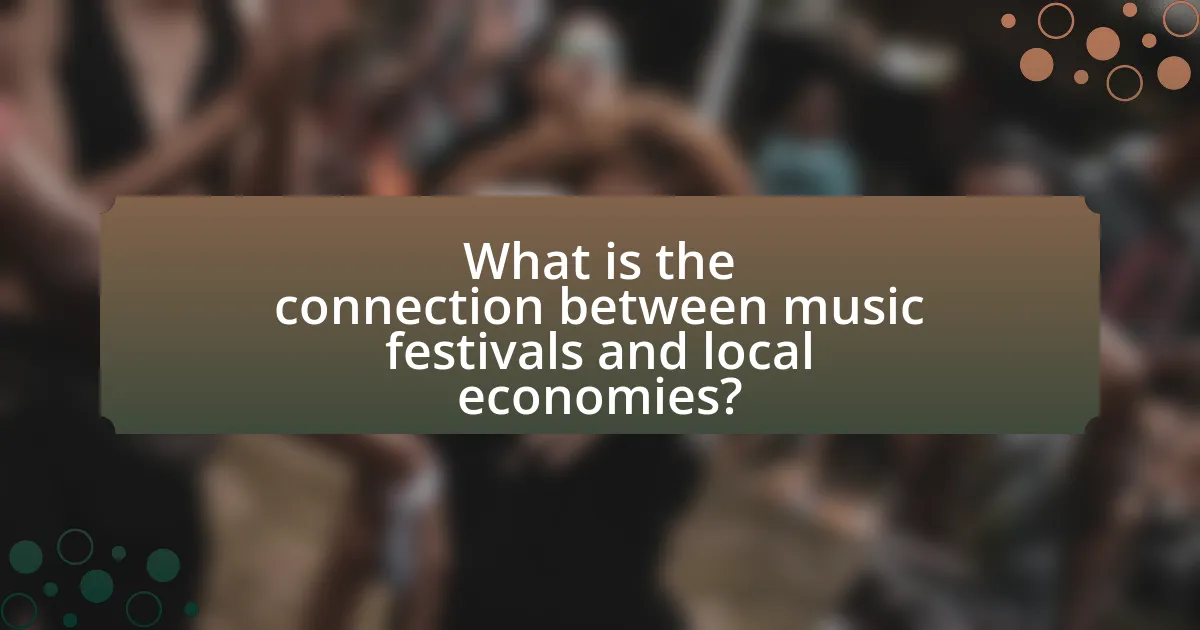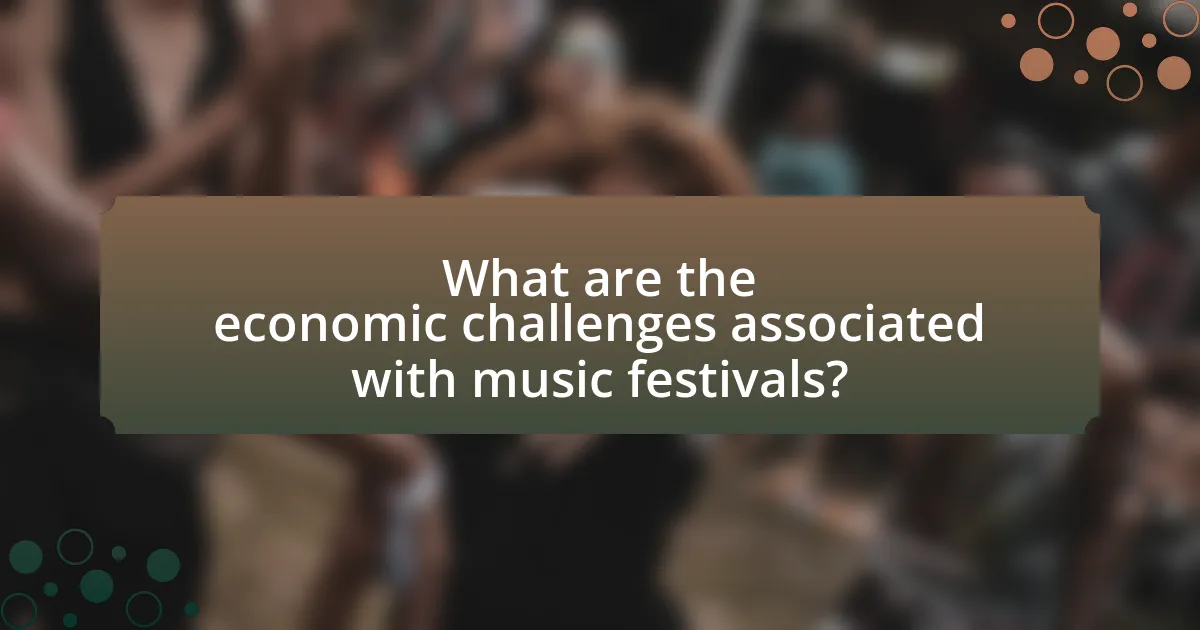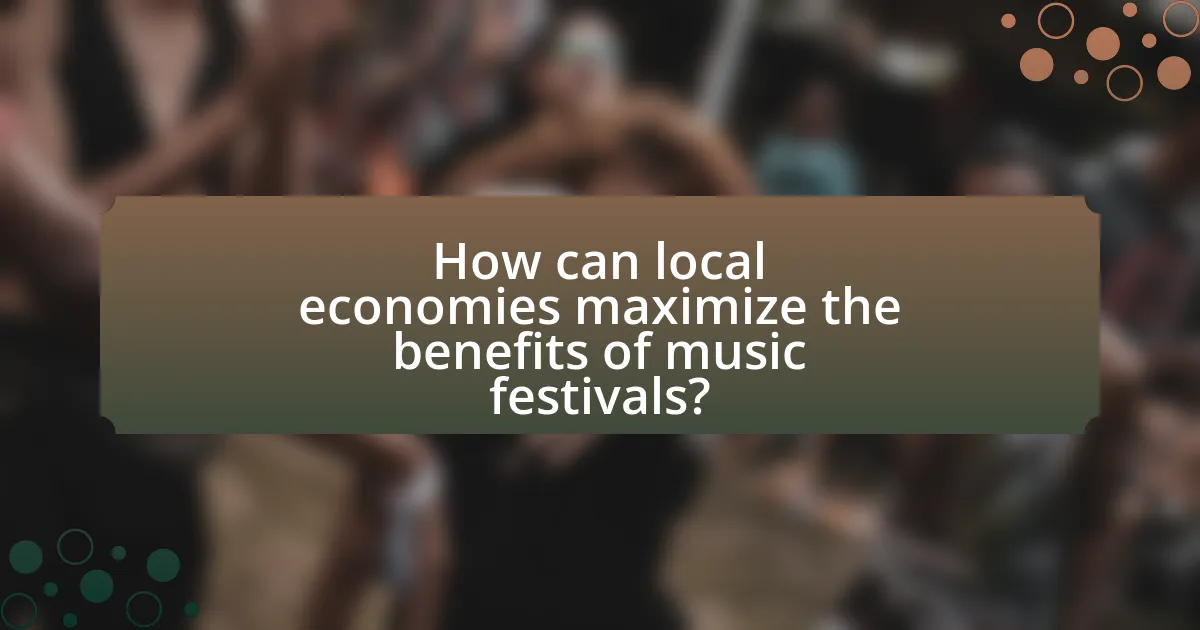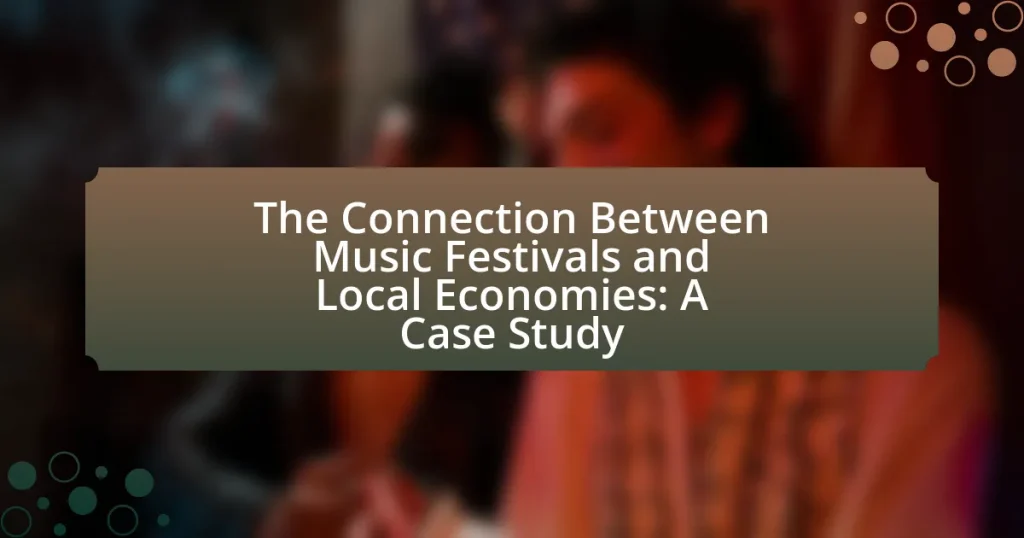The article examines the significant connection between music festivals and local economies, highlighting their role in boosting economic growth through increased tourism, job creation, and local business engagement. It presents case studies, such as the Coachella Valley Music and Arts Festival, which contributed approximately $403 million to its local economy in 2019. The discussion includes the direct financial benefits of hosting festivals, the social and cultural impacts on communities, and the economic challenges faced, such as fluctuating attendance and high operational costs. Additionally, it explores strategies for maximizing the economic benefits of music festivals and the importance of community involvement and effective marketing in ensuring their success.

What is the connection between music festivals and local economies?
Music festivals significantly boost local economies by generating revenue through tourism, hospitality, and local business engagement. For instance, a study by the National Endowment for the Arts found that music festivals can attract thousands of visitors, leading to increased spending on accommodations, food, and entertainment. In 2019, the Coachella Valley Music and Arts Festival contributed approximately $403 million to the local economy, demonstrating the substantial financial impact such events can have on surrounding communities. Additionally, local vendors often see increased sales during these festivals, further integrating the event into the economic fabric of the area.
How do music festivals impact local economic growth?
Music festivals significantly boost local economic growth by increasing tourism, creating jobs, and generating revenue for local businesses. For instance, a study by the University of California found that music festivals can contribute millions of dollars to local economies; the Coachella Valley Music and Arts Festival reportedly generated over $400 million in economic impact for the region in 2019. Additionally, festivals attract visitors who spend on accommodations, food, and entertainment, further stimulating local economies. The influx of attendees also leads to temporary job creation in sectors such as hospitality and retail, enhancing overall economic activity in the area.
What are the direct financial benefits of hosting a music festival?
Hosting a music festival generates direct financial benefits such as increased local revenue, job creation, and tourism stimulation. Local revenue spikes as attendees spend on accommodations, food, and merchandise, with studies indicating that festivals can inject millions into local economies. For instance, the Coachella Valley Music and Arts Festival reportedly contributes over $400 million annually to the local economy. Job creation occurs as festivals require staffing for security, vendors, and logistics, often leading to temporary employment opportunities. Additionally, music festivals attract tourists, which boosts spending in surrounding businesses, further enhancing the economic impact.
How do music festivals influence local job creation?
Music festivals significantly influence local job creation by generating employment opportunities in various sectors such as hospitality, retail, and event management. For instance, a study conducted by the University of California found that music festivals can create thousands of temporary jobs, including positions for security personnel, vendors, and staff for local businesses. Additionally, the economic activity generated by festival attendees, who spend on accommodations, food, and merchandise, further stimulates job growth in the surrounding community. This correlation is evidenced by the fact that festivals like Coachella and Lollapalooza have been reported to contribute millions of dollars to local economies, thereby enhancing job availability and economic stability in those areas.
What role do music festivals play in community development?
Music festivals play a significant role in community development by fostering economic growth, enhancing social cohesion, and promoting cultural identity. These events attract visitors, which stimulates local businesses such as hotels, restaurants, and shops, leading to increased revenue and job creation. For instance, a study by the National Endowment for the Arts found that music festivals can generate millions in economic impact for host communities, with some festivals reporting over $10 million in local spending. Additionally, music festivals encourage community engagement and collaboration, bringing together diverse groups and strengthening social ties. This collective participation fosters a sense of belonging and pride among residents, contributing to the overall well-being of the community.
How do music festivals enhance local tourism?
Music festivals enhance local tourism by attracting large numbers of visitors who contribute to the local economy. These events generate significant revenue through ticket sales, accommodation bookings, dining, and local transportation. For instance, a study by the National Endowment for the Arts found that music festivals can increase local tourism revenue by up to 30% during the event period. Additionally, festivals often promote local culture and attractions, encouraging attendees to explore the area beyond the festival grounds, further boosting tourism-related spending.
What social benefits arise from music festivals in local communities?
Music festivals provide significant social benefits to local communities, including enhanced community cohesion, cultural exchange, and increased social interaction. These events foster a sense of belonging among residents, as they bring together diverse groups to celebrate shared interests in music and arts. For instance, a study by the National Endowment for the Arts found that community engagement in arts events, such as music festivals, leads to stronger social ties and improved community identity. Additionally, music festivals often promote local culture and heritage, allowing residents to showcase their traditions and attract visitors, which can further enhance community pride and cultural appreciation.

What are the economic challenges associated with music festivals?
Music festivals face several economic challenges, including high upfront costs, fluctuating attendance, and potential financial losses due to unforeseen circumstances. The initial investment for organizing a festival can be substantial, often exceeding hundreds of thousands of dollars for venue rental, artist fees, and logistics. Additionally, attendance can vary significantly from year to year, influenced by factors such as weather, competing events, and economic conditions, which can lead to revenue shortfalls. For instance, a study by the University of California found that festivals with lower-than-expected attendance often struggle to cover their operational costs, resulting in financial instability. Furthermore, unexpected events like natural disasters or public health crises can lead to cancellations, causing significant financial losses, as seen during the COVID-19 pandemic when many festivals faced complete shutdowns. These factors collectively contribute to the economic vulnerabilities associated with music festivals.
How can music festivals lead to financial risks for local economies?
Music festivals can lead to financial risks for local economies primarily through the potential for significant economic disruption and unanticipated costs. When large crowds gather, local infrastructure may become strained, leading to increased expenses for public services such as law enforcement, emergency services, and sanitation. For instance, a study by the University of California found that cities hosting major festivals often incur costs that exceed the revenue generated from tourism and ticket sales, resulting in a net financial loss. Additionally, if a festival faces logistical issues or low attendance, the financial burden can fall heavily on local businesses that rely on the event for income, potentially leading to business closures and job losses.
What factors contribute to the financial instability of music festivals?
Financial instability of music festivals is primarily influenced by factors such as fluctuating ticket sales, high operational costs, and unpredictable weather conditions. Fluctuating ticket sales can lead to revenue shortfalls, as festivals often rely heavily on advance ticket purchases to fund expenses. High operational costs, including artist fees, venue rentals, and staffing, can escalate quickly, especially if attendance does not meet projections. Additionally, unpredictable weather can deter attendance or cause logistical challenges, further impacting financial outcomes. For instance, a study by the University of California found that adverse weather conditions can reduce attendance by up to 30%, significantly affecting revenue.
How do weather and external events affect festival profitability?
Weather and external events significantly impact festival profitability by influencing attendance rates and operational costs. For instance, adverse weather conditions such as rain or extreme heat can deter attendees, leading to lower ticket sales and reduced on-site spending. A study by the University of California found that festivals held during inclement weather saw attendance drop by as much as 30%, directly affecting revenue. Additionally, external events like competing festivals or local emergencies can divert potential attendees, further diminishing profitability. Historical data from the Coachella Valley Music and Arts Festival indicates that years with overlapping local events experienced a 15% decrease in ticket sales compared to years without such conflicts. Thus, both weather and external events play crucial roles in determining the financial success of festivals.
What are the long-term economic impacts of music festivals?
Music festivals have significant long-term economic impacts on local economies, primarily through increased tourism, job creation, and infrastructure development. For instance, a study by the University of California found that music festivals can generate millions in revenue for host cities, with the Coachella Valley Music and Arts Festival contributing approximately $403 million to the local economy in 2017. Additionally, festivals create temporary and permanent jobs, with a report from the National Endowment for the Arts indicating that arts-related events, including music festivals, support over 4.6 million jobs nationwide. Furthermore, the infrastructure improvements made to accommodate festivals, such as transportation and public services, often benefit the community long after the event concludes. These factors collectively illustrate the substantial and lasting economic benefits that music festivals provide to local economies.
How do music festivals influence local business sustainability?
Music festivals significantly enhance local business sustainability by driving increased consumer spending and fostering community engagement. These events attract large crowds, which leads to heightened demand for local services such as restaurants, hotels, and retail shops. For instance, a study conducted by the University of California found that music festivals can generate up to $10 million in economic impact for host cities, with local businesses experiencing a 30% increase in sales during festival weekends. This influx of visitors not only supports existing businesses but also encourages the establishment of new enterprises, thereby contributing to long-term economic resilience in the community.
What are the potential negative effects on local infrastructure?
The potential negative effects on local infrastructure due to music festivals include increased wear and tear on roads, strain on public transportation systems, and pressure on utilities such as water and electricity. For instance, a study by the University of California found that large events can lead to significant road damage, requiring costly repairs that local governments must fund. Additionally, public transportation may become overcrowded, leading to delays and reduced service quality for regular commuters. Furthermore, utilities may experience surges in demand, resulting in outages or decreased service reliability, as seen during the Coachella Valley Music and Arts Festival, where local water supplies were heavily taxed.

How can local economies maximize the benefits of music festivals?
Local economies can maximize the benefits of music festivals by strategically investing in infrastructure, promoting local businesses, and fostering community engagement. Infrastructure improvements, such as enhanced transportation and accommodation options, can accommodate increased visitor numbers, leading to higher spending in the area. For instance, a study by the National Endowment for the Arts found that festivals can generate significant economic impact, with some events bringing in millions of dollars in revenue for local businesses. Additionally, promoting local vendors and artists during the festival can create a symbiotic relationship that boosts the local economy while providing unique experiences for attendees. Engaging the community through volunteer opportunities and local sponsorships can also enhance the festival’s success and ensure that the benefits are felt widely across the local population.
What strategies can local governments implement to support music festivals?
Local governments can implement several strategies to support music festivals, including providing financial grants, facilitating permits, and enhancing infrastructure. Financial grants can help cover operational costs, as seen in cities like Austin, Texas, which allocates funds to support its South by Southwest festival, boosting local tourism and economy. Facilitating permits streamlines the process for organizers, reducing bureaucratic delays; for instance, New Orleans has established a dedicated office to assist festival planners. Enhancing infrastructure, such as improving public transportation and accessibility, can increase attendance and participation, as demonstrated by the successful integration of transport services during the Coachella Valley Music and Arts Festival in California. These strategies collectively foster a vibrant festival culture that benefits local economies.
How can partnerships between local businesses and festivals enhance economic outcomes?
Partnerships between local businesses and festivals enhance economic outcomes by driving increased consumer spending and fostering community engagement. When festivals collaborate with local businesses, they create a synergistic environment that attracts attendees who spend money on food, accommodations, and merchandise. For instance, a study by the National Endowment for the Arts found that arts and cultural events, including festivals, can generate significant economic impact, with attendees spending an average of $27 per person, per day, on local businesses. This influx of spending not only boosts sales for local vendors but also creates job opportunities and stimulates further investment in the community. Additionally, these partnerships can lead to enhanced marketing efforts, as festivals promote local businesses, thereby increasing their visibility and customer base.
What role does marketing play in promoting local economic benefits from festivals?
Marketing plays a crucial role in promoting local economic benefits from festivals by attracting attendees and increasing visibility for local businesses. Effective marketing strategies, such as targeted advertising and social media campaigns, can significantly boost ticket sales and participation rates, leading to higher spending in the local economy. For instance, a study by the National Endowment for the Arts found that festivals can generate millions in revenue for local communities, with attendees spending on accommodations, food, and merchandise. This influx of visitors not only supports local businesses but also creates job opportunities and stimulates further economic development in the area.
What best practices should organizers follow to ensure economic success?
Organizers should implement strategic planning, effective marketing, and community engagement to ensure economic success. Strategic planning involves setting clear financial goals, budgeting accurately, and forecasting potential revenue streams, which can lead to a more sustainable festival model. Effective marketing, including targeted advertising and social media campaigns, can increase ticket sales and attract a larger audience, as evidenced by the 2019 Coachella festival, which generated over $114 million in revenue. Community engagement fosters local support and participation, enhancing the festival’s reputation and encouraging local businesses to collaborate, which can further boost the local economy.
How can festival organizers engage with the local community effectively?
Festival organizers can engage with the local community effectively by incorporating local culture and businesses into the festival’s programming. This approach not only showcases regional talent and traditions but also fosters a sense of ownership among community members. For instance, involving local artists, food vendors, and craftsmen can enhance the festival’s authenticity and appeal, as evidenced by the success of events like the New Orleans Jazz & Heritage Festival, which highlights local musicians and cuisine, thereby boosting local economic activity. Additionally, organizers can host community meetings prior to the event to gather input and address concerns, ensuring that the festival aligns with community interests and values. This participatory approach has been shown to increase local support and attendance, ultimately benefiting both the festival and the community.
What are the key metrics for measuring the economic impact of a music festival?
The key metrics for measuring the economic impact of a music festival include direct spending, job creation, tax revenue, and visitor demographics. Direct spending refers to the total amount of money spent by attendees on accommodations, food, transportation, and merchandise, which can significantly boost local businesses. Job creation is measured by the number of temporary and permanent jobs generated as a result of the festival, including positions in event management, hospitality, and security. Tax revenue encompasses the income generated for local governments through sales taxes, hotel taxes, and other fees associated with the festival. Visitor demographics provide insights into the economic profile of attendees, including their spending habits and geographic origins, which can inform future marketing and investment strategies. These metrics collectively illustrate the festival’s contribution to the local economy, as evidenced by studies showing that festivals can generate millions in economic activity for host cities.
What are the lessons learned from successful music festival case studies?
Successful music festival case studies reveal several key lessons: effective community engagement, strategic partnerships, and robust logistical planning are essential for success. Community engagement fosters local support and participation, as seen in festivals like Coachella, which actively involve local businesses and residents. Strategic partnerships with sponsors and local organizations enhance resources and visibility, exemplified by the collaboration between Glastonbury Festival and various charities, which boosts community goodwill. Additionally, meticulous logistical planning, including crowd management and safety protocols, is critical; for instance, the successful execution of Lollapalooza demonstrates how thorough planning can mitigate risks and enhance attendee experience. These lessons underscore the importance of collaboration and preparation in maximizing the economic and social benefits of music festivals for local economies.
